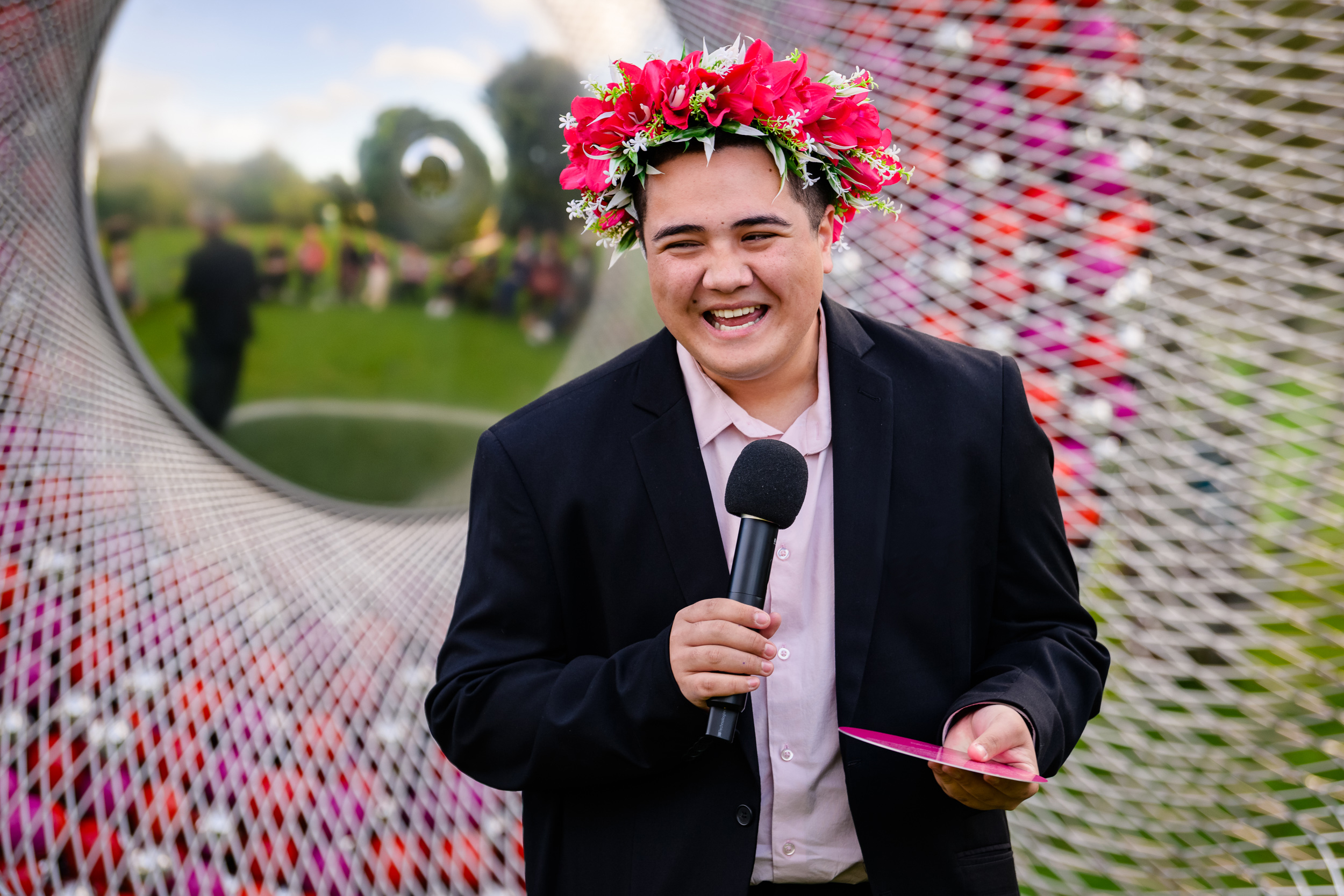Tyler Oroanu
Profile
Kia Ora, Kia Orana, warmest greetings.
My name is Tyler Cornelius Toparea Oroanu. I am a proud descendant of Ivirua in Mangaia and Rarotonga, in the Cook Islands. Equality, equity, and politics have fascinated me since I was little. In 2023 my dream of political involvement came true by volunteering for Jenny Salesa’s re-election campaign in Panmure-Ōtāhuhu. Through 1001 Spheres, I give my vision for a gender-equitable Aotearoa. As the youngest contributor, our future is crucial because it will be māpū (young people) who’ll inherit it.
Thank you, aere ma te meitaki e te au, go safely and in peace.

Insight
Tyler enthusiastically exceeded the suggested word limit and so together with Tyler we created an edited text to print onto the disc. Here is Tyler’s full beautiful text, entitled:
A vision of a gender-equitable Aotearoa.
I’ve never believed in gender equality as I hear it now.
Of course, there are extremes between men and women. Women put up with too much unfairness in Aotearoa. Sexism, misogyny, mutilation, expectations to ‘cover up’, to run the house, to raise the children, the gender pay gap, and more. These are only getting worse and coupled with a wave of digital misogynists raising a generation of boys, it’s hard to see how it’ll get better.
But so often when we talk about gender equality, we jump to inequalities between men and women. We forget the entire spectrum of gender for the growing numbers of people, including myself, who don’t fit neatly into that binary system. Sometimes, in an isolated country like Aotearoa, we forget there are people around us who don’t identify as male or female because stories about them are never local. But gender-diverse people exist here too; some are trans-, demi-, and omni-gender, genderfluid, gender-neutral, and so much more. There is the LGBTQ+ community and swaths of Pasifika who don’t fit westernised gender standards.
So many times when we discuss gender equality, we glance over those who occupy the middle ground between men and women. For a genuinely gender-equal society, they need to have their concerns addressed too.
As a result, when I hear the phrase “gender equality”, I prefer to say “gender equity” instead. Gender equity is giving each person what they need to have the best opportunities possible. This differs from gender equality, which is simply making sure everybody has the same things on offer.
Giving everybody the same doesn't equal fairness. People who aren’t judged for being pregnant, wanting to transition, or wanting to stay single won’t need as much support as those who are affected by these situations and others.
So, when I’m asked for my vision of a gender-equal Aotearoa, I instead offer my image of a gender-equitable Aotearoa, and it looks something like this:
I picture an egalitarian society, where the playing field is levelled for everybody and those who need the most support are able to receive it, even if that means getting more than those who need little or no support. I picture a country where people are free to live their lives under whatever identity they feel most comfortable with, and the era of judgement for having a different sexual or gender identity, or any other “abnormal difference”, is left behind.
I see a rainbow utopia. A society where transgender people can access gender-affirming care when they need it, where rainbow communities can be out and proud without being harassed or persecuted. Where women are celebrated for independence and applauded for leading, to name some.
I see a gender-equitable Aotearoa. What do you see?
Te Reo Glossary
Te Reo Glossary
ākonga
student, pupil
alofa
love, affection (Cook Islands Māori language)
Aotearoa
New Zealand
aroha
love, affection
haere rā
goodbye, farewell
hapū
subtribe, part of a kinship group
ira tangata
term used for intersex in a Māori context
irawhiti
term used for transgender in a Māori context
Itāria
Italy
iwi
extended kinship group descended from a common ancestor and associated with a distinct territory in Aotearoa
kairangahau
researcher
kaitiaki
guardian
kaitiakitanga
guardianship, stewardship
kia kaha ngā wāhine toa
be strong woman warriors
kia ora
hello, greetings
kia orana
hello, greetings (Cook Islands Māori language)
kōrero
conversation, discussion
kuia
female elder
mahi
work
māmā
mother, mum
mana
status, prestige, authority,
Māngere
a major suburb in South Auckland, New Zealand
Māori
Indigenous people of Aotearoa New Zealand
mauri
life force, life principle
moana
ocean, sea
Ōtautahi
Christchurch, city in South Island, New Zealand
Ōtepoti
Dunedin, city in South Island, New Zealand
pākeha
New Zealander of European/foreign descent
peka
branch (of a tree, river, organisation)
Pōneke
Wellington, Capital of New Zealand
rangatahi
youth, young people
takatāpui
queer, gay, rainbow community
Tāmaki Makaurau
Auckland, city in North Island, New Zealand
tapu
sacred, prohibited
tautoko
to support, advocate
Te Kāhui Tika Tangata
Human Rights Commission, New Zealand
Te Kaunihera Wahine o Aotearoa
National Council of Women of New Zealand
Te Kotahitanga
Autonomous Māori Parliament from 1892 to 1902
Te Moana-Nui-ā-Kiwa
the Pacific Ocean
te reo
the Māori language
Te Ropu Wahine Maori Toko i te Ora
Māori Women’s Welfare League
Te Wāhi Wāhine o Tāmaki Makaurau
Auckland Women’s Centre
tikanga
protocol, correct procedure
wāhine
woman, women
wāhine kaha
strong woman/women
waiata
song, chant
waiata taitoko
song of support usually sung after a speech
wairua
spirit, soul
whakapapa
genealogy, lineage
whānau
family, extended family group
whare
house, building